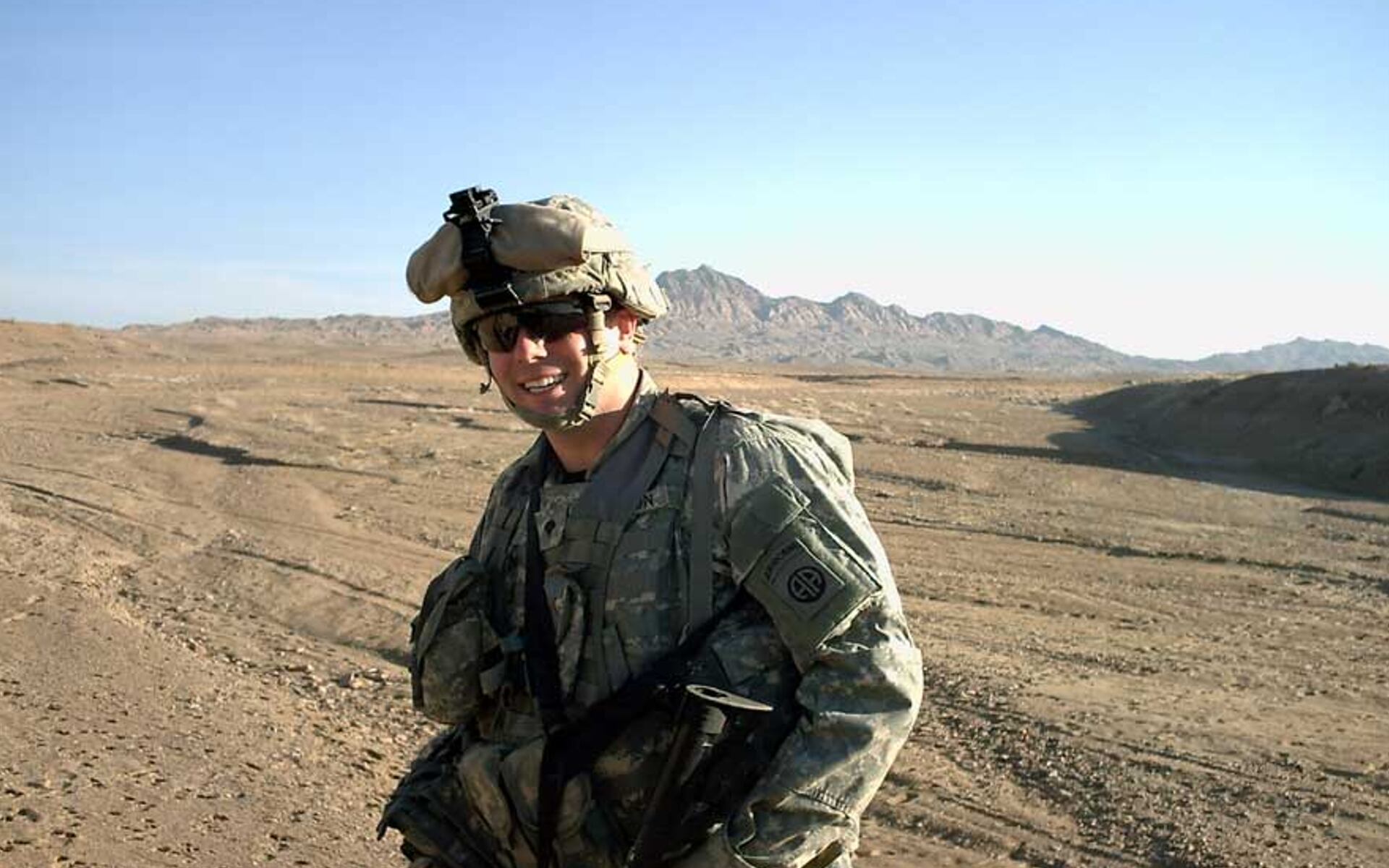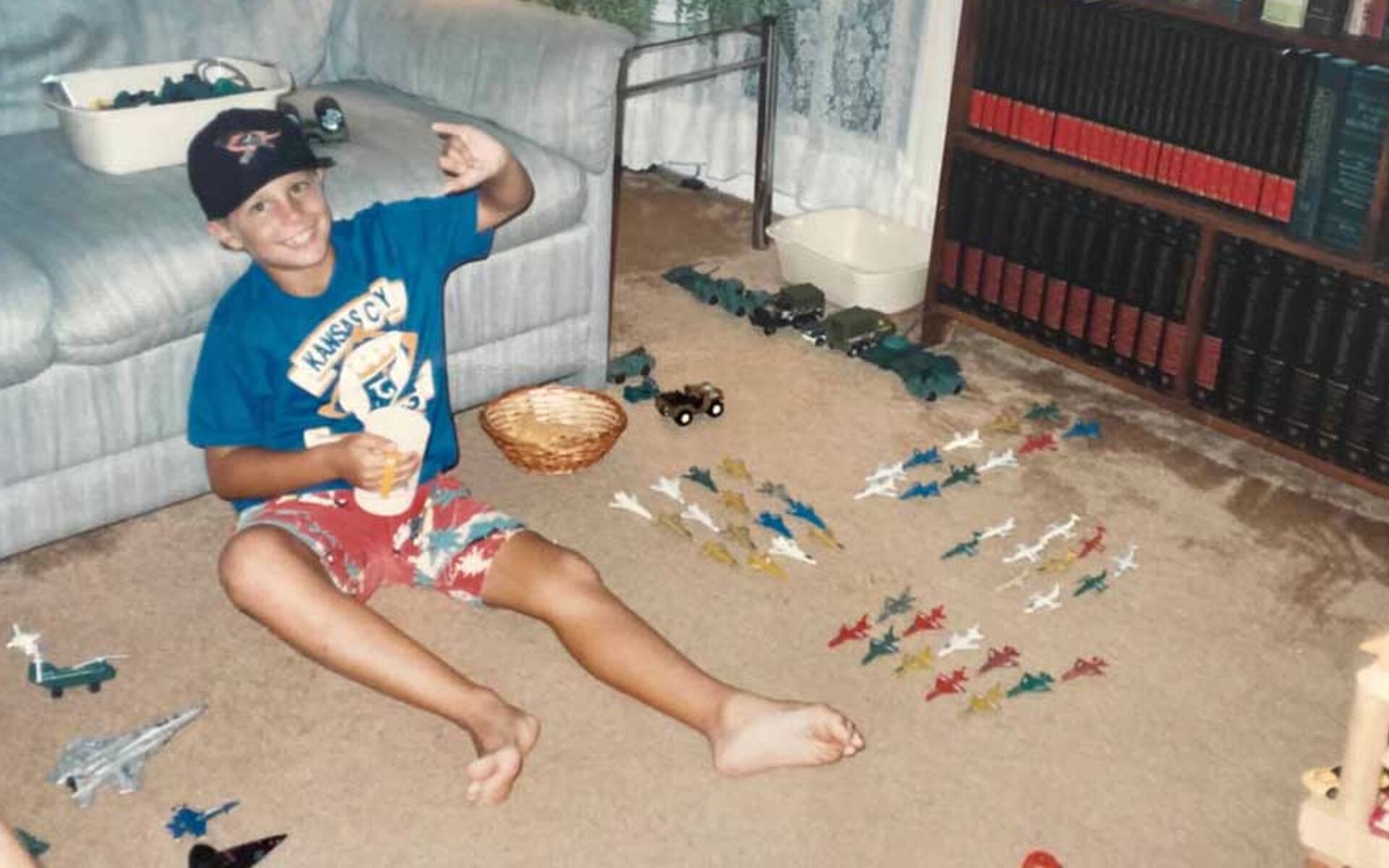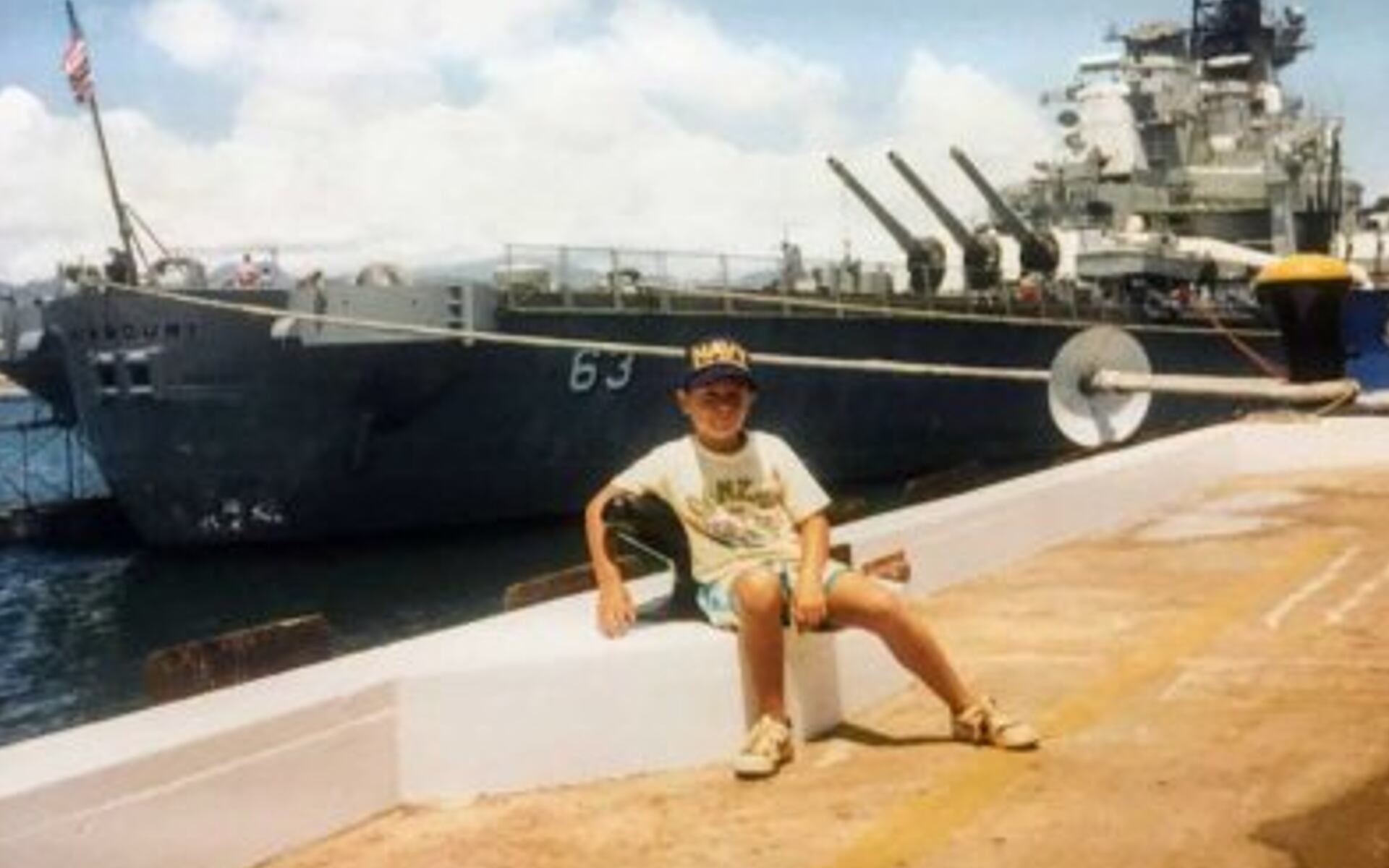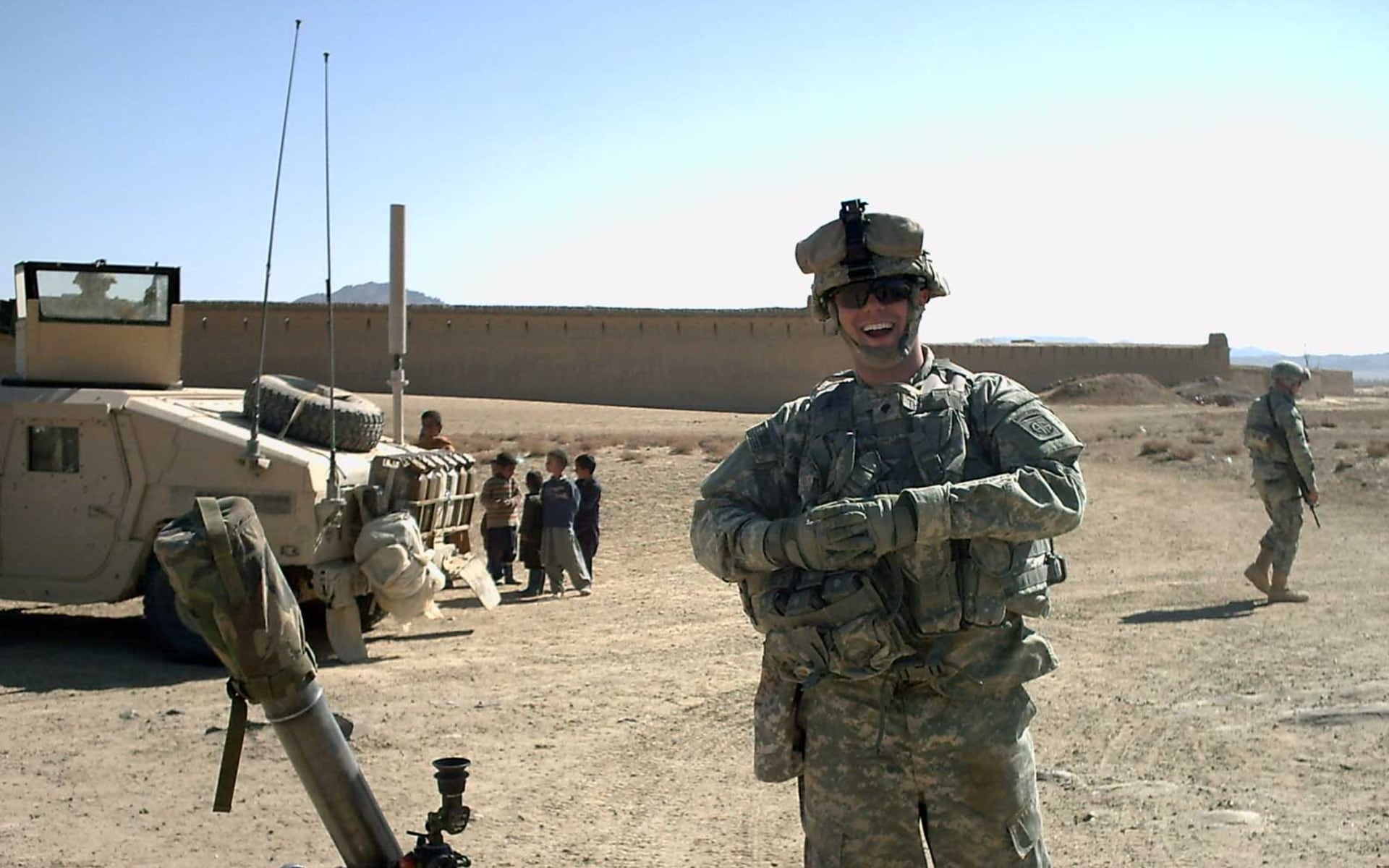Editors Note: This article first appeared on The War Horse, an award-winning nonprofit news organization educating the public on military service. Subscribe to their newsletter.
New Year’s Day 2008 marked the most memorable day of my deployment in Afghanistan. I replay the events over and over, like an old VHS tape running in my head. But unlike the movies that shaped my childhood — which I’ll get to later — there’s no joy in reliving the experience. There’s gunfire and explosions. There’s screaming. And there’s one image where my mind hits the pause button: I can never stop seeing the smiles on the faces of the Afghan children.
The day started like most days outside the wire on deployment.
From an overwatch position outside a village, we looked down to a place seemingly untouched by time. The mud huts and villagers could make a person believe our Humvees were Army-issue versions of Doc Brown’s DeLorean. We hit 88 miles per hour, and — poof! — we were back to the time of Alexander the Great. But this was the 21st century.
As Americans back home battled hangovers, we waited, on alert. A group of villagers — men and children — assembled to stare at us. Many of the men squatted, like catchers calling pitches. The children would grow bored, and they’d run off to play games. Women were not invited to this party. They stayed hidden in their homes or worked in the fields.
When people find out I deployed to Afghanistan, they often ask, “What was it like?” Some picture Hollywood’s version — the nonstop action of “Lone Survivor” or “Black Hawk Down.” I wish they could have heard my platoon sergeant’s take on the matter from the front seat of our Humvee.
“We’re nothing but a bunch of fucking zoo animals.”
The metaphor has truth to it. Villagers stared at us for hours on end like they were watching captive pandas. The Afghan people enjoyed seeing us go about our daily routines in an undisturbed state, doing everything from brushing our teeth and taking bathroom breaks to eating our “meals, ready to eat” (more commonly called MREs).
We never bothered them. We only returned their gazes like our deployment was a never-ending staring contest. How long could we go without blinking? Twelve months into this deployment, one of us had finally had enough of the game.
It happened at the start of my feeding time. The radio squawked while I tore into the packaging of my favorite MRE, the spaghetti and meatball, which reminded me of the Chef Boyardee meals I ate as a kid. The booming voice of my bald first sergeant, who looked like Mr. Clean on performance-enhancing drugs, drowned out the radio chatter: “That guy’s bad,” he shouted. “He’s bad!”
Before I could act, my first sergeant was outside the Humvee firing his M4. My initial reaction wasn’t shock or fear. It wasn’t even to reach for the automatic rifle resting on top of the Humvee. I did something that, when I look back, makes absolutely no sense: I put away my meal.
I wasn’t about to spill marinara sauce on the Humvee seats and upset Mr. Clean.

After casually putting all my food in the plastic MRE bag to save for later — like this attack was a simple break in my daily routine — I opened the door and grabbed my rifle. I stepped outside into the world of Afghanistan. It felt like I was leaving the airlock and entering the vacuum of space. At least the air was fresh out here, giving me a break from the horrible smell festering inside the Humvee. That’s another thing about deployment. It stinks for an infantryman. Weeks without showers and MRE-induced flatulence add to the sense you’re in a zoo.
The relief of fresh air soon gave way to the smell of gunpowder and the crackle of gunfire as Mr. Clean continued to pop off rounds. He’d probably fired 10 shots by the time I started to scan my surroundings as I tried to pinpoint what in the hell he was firing at.
Where are the bad guys? I still hadn’t seen a terrorist or the Taliban. We might be zoo animals, always on display for the villagers. But the bad guys were like phantoms: unseen in the landscape but menacing in our minds. They planted IEDs and attacked us in ways that eluded engagement.
The children running for cover caught my attention. As they sprinted to safety, some turned their heads to look back at us. They smiled like they were playing a game of hide-and-seek.
This reminded me of my childhood in Hawaii. I spent the days running around with a gang of neighborhood kids, from sunrise to sunset, only breaking for lunch and returning home for dinner. We laughed and smiled, too, but our games — football, tag, and even imaginary war games — didn’t involve dodging actual bullets. I doubt I’d be smiling while I ran for cover. But this was Afghanistan, a country that had been at war since 1979, a year before I was born. These kids had grown up living with war. And even in the horror of war, soldiers crack jokes and kids smile.
As I watched the children scatter, I worried my first shots in Afghanistan would hit some innocent kid. I didn’t want to live with that guilt haunting me for the rest of my life, so I wasn’t about to fire indiscriminately into the crowd. I thought back to my Army training: First, identify the target.
As I continued to scan for the bad guy, an explosion refocused my attention. I saw smoke and dust shoot up from behind our Afghan allies’ Humvee, which was positioned closer to where the kids had started their sprint. An Afghan soldier entered my line of vision, scurrying away from the blast. He didn’t smile like the kids running to safety; fear painted his face.
While I scanned for a target, a flying object entered my view. It popped up from behind the Humvee, and I tracked its arc through the sky as it headed toward us. I watched it like it was a pop fly before my brain snapped to attention and I realized this wasn’t a baseball.
I stood behind the open door of the Humvee, knowing a grenade was inbound. But the consequences of it landing near us didn’t concern me. I treated the entire experience like I was doing something as casual as watching a baseball game from the stands, tracking the explosive device like it was a ball thrown in from the outfield. But this Taliban fighter didn’t have a professional ballplayer’s arm. He threw like the error-prone kid you pick last for Little League. The incoming explosive landed about 30 feet from our position, stirring a small cloud of dust, followed by a series of smaller puffs as the grenade skipped like a stone across the dry ground. After three little hops, it stopped. I waited for an explosion that never came. It was a dud.
Throughout the shooting, the explosion, and the grenade, I remained calm. I never felt afraid. Somehow, I remained both focused and detached from the situation. I hit the instant-replay button in my mind and followed the flight path of the grenade back to its origin. I spotted the grenadier. He was out in the open, running from the bullpen to take the mound and close out the game. He presented the perfect target.
After almost a year of chasing ghosts from one village to the next, I now watched a living, breathing enemy while he reached for another grenade, determined to kill me. I had trained for this moment for my entire life. As a child, I fought numerous battles with my GI Joes, chased the neighborhood kids with toy guns, and dreamed of one day being a war hero. This was no longer make-believe. Here was my chance.

I raised my rifle, carefully took aim, exhaled, and gently squeezed the trigger.
Victory has always been a driving force in my life.
I blame Hollywood. As a child of the 1980s, I repeatedly watched “Top Gun” and “Red Dawn.” I cheered when Maverick shot down enemy MIGs, and I was ready to take on the Russians if they invaded my hometown. More than anything, I wanted to live out the end of my favorite movie, “The Natural.” I wanted to hit the game-winning home run and trot around the bases to inspirational music and cheering fans.
Those formative childhood ambitions changed shape over time. Yet the cinematic images and that desire for a clarifying, victorious moment managed to guide my major life decisions in the ensuing decades. After college, I found a job at a law firm, working as a paralegal. I labored away, looking ahead to the days when I’d have a law degree and find a job as a litigator. Sure, it wasn’t as exciting as becoming a naval aviator, but I could still shout declarative truths in a courtroom, like Tom Cruise’s character in “A Few Good Men.”

At that time, the Iraq War was in full swing. Every night, I watched as men and women my age fought and died in the streets of Iraq while the news reported recruiting shortages. The war movies I’d watched as a kid and the real-life military presence I’d grown up around had impressed in me a desire to serve my country. So, I decided to put aside my legal aspirations, enlist in the Army, and join the 82nd Airborne Division as a paratrooper.
The unit’s legacy resonated with me. Even as an adult, I was still a sucker for Hollywood’s vision of the military in shows like “Band of Brothers.” The paratroopers of Easy Company had jumped into D-Day, liberated a concentration camp, and captured Hitler’s Eagle’s Nest. I could easily mesh these dramatized events into my expectations of the very real war I prepared to join.
I ended up deploying to Afghanistan. Predictably, the conflict I found there wasn’t anything like World War II — there were no big battles, and we saw very little of our enemy.
I wonder what came first: the movie version informing real life or real life informing the movie version. If I hadn’t watched heroic war movies as a kid, would I have experienced that stressful event in Afghanistan as a calm observer watching from the outside, like I was sitting in the safety of a movie theater back home? Or would I have felt the raw shock and terror of that moment? In reality, my response likely had more to do with my military training than my childhood movie-watching habits. But my actual war experiences have certainly forced me to recalibrate my worldview as an adult.
If the movies of my childhood in any way prepared me for war, I’d give credit to Arnold Schwarzenegger for what happened next. I fired several rounds, and soon our entire squad was engaged. I knew we were hitting our target, but this guy wouldn’t go down. He kept coming at us, like the Terminator. He wasn’t a cyborg, but I’m pretty sure he was on drugs. The 5.56 mm rounds we fired didn’t stop him. The grenadier was still moving and preparing to throw that next grenade.
My weapon jammed. Still emotionally detached from the situation, I calmly went through the steps I learned in training to fix it. It didn’t work, so I took a knee to examine my weapon. As I knelt, an intense burst of gunfire rang out, distinct from the other weapons firing. One of our guys had climbed into the turret of his Humvee and fired the M240, sending more powerful rounds at our target.
The bullets produced a series of dull thuds upon impact, the brutal force of the weapon finally bringing the target down.
We stopped shooting, and quiet fell as we all looked at the fallen man. The turret gunner finally broke the silence, shouting, “I got him, first sergeant!” I take comfort in those words because I can put that kill on him. I’m sure I hit the grenadier, but my shots didn’t deliver the fatal blow.
This memory hasn’t inhibited my progress in life, and I can typically manage it when it appears. But I don’t control its appearance.
This is the part that movies didn’t prepare me for. Sometimes, that memory comes up unexpectedly, like when I see a group of kids running; other times, I know it will come. When the clock strikes midnight on New Year’s Day and people celebrate, I usually don’t. Instead, New Year’s Day 2008 replays on loop in my head. I stayed calm throughout that firefight, even as my weapon jammed. But all these years later, it’s that death that comes back to me. Movies don’t prepare you for what happens when the action dies down.
The work I now do closes a circle on much of my life experience. Movies have had an outsize impact on my life. It only makes sense that I become a screenwriter.

Movies about heroic figures doing heroic deeds often leave out one crucial piece. As a kid, I wasn’t concerned about the main characters’ lives after the battle or the big game. My boyhood self might have thought they lived happily ever after, content with memories of big victories. But we know that the post-action reality for many veterans can be much more complicated.
As much as I’d love to write sequels to my favorite childhood action films that earn millions at the box office, watching the cataclysmic withdrawal from Afghanistan play out in real time reminds me of a greater purpose than making lots of money. It has taken almost three decades, but I’ve realized that storytelling helps us process painful events and discover the truth in these experiences.
I write to reveal the truth on issues that matter to me. The truth is often the first casualty in war. I have heard repeated lies out of the mouths of politicians and generals when discussing the war in Afghanistan. They would say we’re making progress and turning the corner in this fight. They would go out of their way to promise that the Afghan security forces would hold up against the Taliban. They would predict the withdrawal wouldn’t be anything like Saigon. Enough with these lies.
The 20-year war in Afghanistan is one of the most complex narratives to tackle for any storyteller. It won’t be easy, but my experience as a veteran and my relationships with those I served alongside motivate my future work as a screenwriter.
War continues to plague humanity — and the war never ends for the combat veteran trying to find peace again after the battle is over. And veterans need to share their stories not only to heal but also in service to others, helping us all understand the impact of this war and the wars to come.
Brian Thompson recently left his job as director of veterans correspondence at Veterans Affairs to pursue a master of fine arts in screenwriting at Boston University. Before chasing the Hollywood dream, Thompson served his country and community for more than 15 years as an Army paratrooper, high school teacher, and public servant. Thompson lives in Washington with his wife and son. He still finds ways to insert Top Gun quotes into daily conversation.
Have an opinion?
This article is an Op-Ed and as such, the opinions expressed are those of the authors. If you would like to respond, or have an editorial of your own you would like to submit, please email Military Times Managing Editor Howard Altman.
Want more perspectives like this sent straight to you? Subscribe to get our Commentary & Opinion newsletter once a week.




